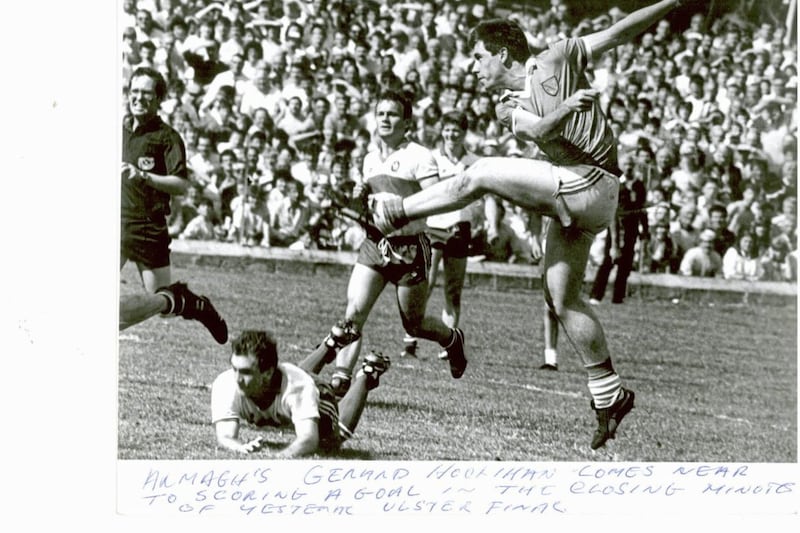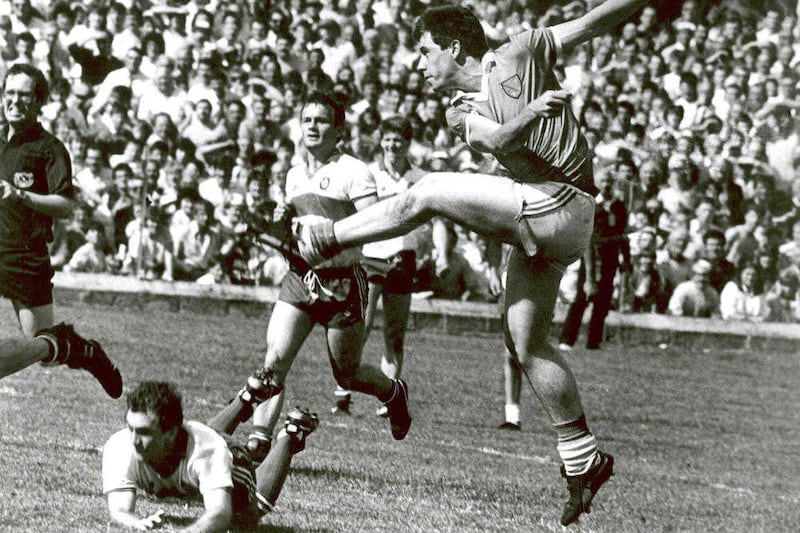HE wears glasses these days and the jet-black hair has turned to grey, but the great man hasn’t changed that much.
“You wouldn’t remember me playing,” says Ger Houlahan, far too generously, when we meet in the Armagh City Hotel.
Of course I remember him and, like everyone who did, I have my favourite memories of ‘Hoully’ in his pomp.
A moment from the 1994 National League final springs to mind. I can still see him breaking through the Meath defence on the right of the square and, in full flight, driving a dipping left foot shot that beat the ’keeper and smashed off the bar.
The Armagh fans who’d packed the old Railway End terrace at a rapidly-changing Croke Park saluted their hero’s trademark audacious brilliance with a chorus of ‘HOOOOU-LAAAY, HOOOOU-LAAAY’.
But Meath went on to win and that was typical of Armagh’s fortunes between the Ulster titles of 1982 and 1999 when sweet moments of magic took the bad taste off forgettable results.
There were plenty of other good players around, but it was Houlahan’s misfortune that he came along at a time when Armagh forgot how to win the big games. By the time the county remembered again, he was approaching the end of a remarkable 17-year career that spanned three decades.
The Allstar full-forward comes from “five generations of inter-county goalkeepers” and one of them, his great-uncle Joe, was a founder member of Armagh Harps.
But ‘Hoully’ played his football with their city rivals St Brigid’s CBS and Pearse Og before entering the inter-county senior stage as a precocious 17-year-old in October 1983.
The following summer he scored goals in every round of the Ulster Championship including the final, but a certain Frank McGuigan scored 11 points and Tyrone took home the Anglo-Celt Cup.
In those days, that was that.
“In my time - 1983-2000 - you didn’t get a second bite at the Championship,” explains Houlahan, deputy director of recreational services at Armagh, Banbridge and Craigavon council.
“I saw us beat in the preliminary round and out of the Championship by the May Bank Holiday weekend and you had the whole summer to yourself.
“That was the potential. You played one match whereas county players now have the backdoor and Mayo were talking about playing seven matches through the Qualifiers to get to the All-Ireland final.
“In my day seven matches would have won you two All-Irelands if you were a Kerry player! The dynamic has changed and I think some of the jeopardy where everything is on the line has gone with the backdoor – I’ve never been a fan of it.
“In my era you did your hard eight weeks of training and you left everything out on the field. Whether it was luck, refereeing decisions, injuries or whatever, you emptied the tank.
“You were all in and if you were beat you were beat.
“Then the problem was you came back two stone heavier for the following National League!”
If Armagh exited early he devoted his time to the club and Pearse Og won their first county title in 1985. They repeated the feat in 1988 before going on a run through Ulster to a final against Burren.
There was no resting up for the game back then and Houlahan played for Armagh against Monaghan the week before the decider. He broke his ankle, missed the final and the break could have ended his career.
“The surgeon says: ‘I’m going to put a slab of metal in your ankle’. I said ‘But I want to play football’,” he recalls.
“My local doctor told him to see what he could do and he said he’d try something and see how it worked.
“He put a pin in and it’s been great ever since. I played right through and I still play when I get the opportunity - in-house games with the Ogs. I can’t breathe, but I still do it.”
Back in the late 1980s, if you wanted to play county football, you were left to your own devices.
Maybe there was occasional contact from the Armagh management, but Houlahan did the recovery and rehab himself and he was a different player when he returned to the fold.
“It was only after ’88 that I went from being a wing player or a midfielder to being a full-forward and a lot of that was down to mobility,” he explains.
“After ’88 I was more into power and speed.”
He adjusted to his new role up front and the goals began to flow.
1993, his Allstar year, when Armagh played six games and didn’t make the final in an ultra-competitive Ulster Championship - that included the previous, reigning and current All-Ireland champions - was an unforgettable season for him.
“The only match people remember was the one we lost,” he says, referring to the semi-final replay against Donegal (Armagh had already won replays against Fermanagh and Tyrone).
“We had Donegal beat and we got a terrible refereeing decision. John Duffy was supposed to have been pushed by Collie Hanratty, but it was a blatant dive and they got a draw and beat us in the replay.
“We were good in 1993, we should have won Ulster. We proved it in 1994 when we got the National League final.”
During that 1993 season and on into 1994, Houlahan divided his time and seemingly boundless energy between Armagh and Sligo Rovers. A good enough soccer player to have been offered a trial by Luton Town in 1981 (he didn’t go), he played for Monaghan Town, Armagh City, Ards and Milford Everton before signing for ‘The Bit o’ Red’.
“When I went there at the start they couldn’t believe you would go and play Gaelic when you were getting paid to play soccer,” he explained.
“The manager was Willie McStay (Celtic European Cup winner). He used to say: ‘But I’m giving you money…’
“It was decent money at the time – at that stage I was working at the swimming pool in Armagh. On Fridays I would have taken a half-day, shot down the road and played for Sligo and then came back and trained for Armagh the next day. It was a quare spin in a Nissan Sunny!
“Jim McCorry (the Armagh manager) was brilliant with me. As long as it didn’t affect my Gaelic he allowed me to play both.
“My idea was to stop at Christmas and at that stage we had already won the League Cup and we were in a good position in the league. I thought my season was over and then they got a replay in the FAI Cup first round at Tolka Park.
“Willie rang me and asked me ‘Will you play?’ I told him to ring Jim and he allowed me to.”
Throughout the campaign he juggled both codes and played the assist for Eddie Annand’s winner in the semi-final as Sligo reached the final of a competition they’d won just once in their history. But the date, May 15, clashed with Armagh’s Ulster preliminary round game with Fermanagh.
“It was sod’s law,” says Hoully with a wry smile.
“Sligo ones were saying: ‘Sure you’ll beat Fermanagh?’ But it was never in doubt that I would play for Armagh – sure I had to live here!”
Armagh did beat Fermanagh and Sligo beat Derry City to win the cup. If you weren’t in the squad, you didn’t get a medal, but the club gave him one anyway.
Despite his commitment to Armagh, he was labelled ‘a soccer man’ in some old-fashioned quarters and was charged with bringing a bit of soccer pizzazz into the GAA. The suggestion irritates him.
“That was all blown out of proportion,” he says.
“I still get that: ‘Oh you were up on the wire…’” he adds, in reference to an off-the-cuff goal celebration that has stuck with him.
“At the old pitch at the Athletic Grounds there wasn’t a big gap between the goals and the wire. I ran in and scored a goal and I jumped up on the wall rather than run into it. Then I was up holding onto the wire celebrating.
“It didn’t happen every time I scored a goal, but it has lived with me ever since and I still get it today.”
Given that he lost, or missed, several finals over his career, I put it to him that he didn’t get the success a player of his ability should have. Then again, he won every All-Ireland title going at school with St Brigid’s, was player of the tournament in the Sigerson Cup with Jordanstown, he was an Allstar in 1993 despite not playing in the Ulster final, he won two Armagh championships with the Ogs, etcetera, etcetera, etcetera…
And of course there are the Ulster medals he won with Armagh in 1999 and 2000 too. But they’re not exactly treasured possessions.
“It was ironic that the two Ulster medals I won with Armagh came when I was sitting on the bench,” he says.
“I don’t even know where they are – in general medals don’t mean that much to me. I look forward, not back.
“The last two years were a struggle, the boys were very good to me and everybody else, but sitting on the bench…
“Stevie (McDonnell) was coming in, Oisin (McConville) was beginning to establish himself, the McEntees (John and Tony) were there.”
The end came in September 2000 when he replaced Paddy McKeever late in the All-Ireland replay against Kerry. He set up a goal chance for Oisin McConville, but the Kingdom won a thriller 2-15 to 1-15.
“The problem for subs was – and I still see it today – that they don’t get enough football,” he says.
“Then you’re thrown on to try and win a match when you mightn’t have played a club match or a high-intensity match outside of training.
“You need to have played games if you’re expected to get chucked in at a crucial stage.”
He says he “kind of knew” that was that for him. But retirement wasn’t his call. The management team – Brian McAlinden and Brian Canavan – made the decision for him.
“With Armagh the managers retired me – the Kerry match was the end,” he said.
“I had never been a sub from 1983 until 1999 and I was playing less and less. I was almost like a father figure and I was trying to be good around the camp, but it was frustrating, I was training hard and then not getting on and I wasn’t getting any club football.
“I won two Ulsters and, regardless of where the medals are, I won them as part of that squad but I didn’t contribute to the squad.
“I played in the 1999 final against Down but the boys used to say: ‘The crowd came on before you did’. It is what it is.”
Two years after he bowed out, Armagh won the Sam Maguire and of course, Hoully would have loved to have been part of it.
Is he bitter? No, not bitter, but he was hurt at the time. It’s not the end he would have chosen and maybe there is a lesson to be learned from this about how we treat our heroes in the GAA.
Still, he’ll always be grateful for the time he had.
“They were great days,” he says.
“I played across three decades and I could count my good seasons and my bad seasons.
“Some of them were personal, some of them were because the team was bad. It was long haul, but I wouldn’t change it.”
We chat for an hour and then off he goes, back to work. What Armagh wouldn't give for a player like him now?
HOOOOU-LAAAY, HOOOOU-LAAAY...




